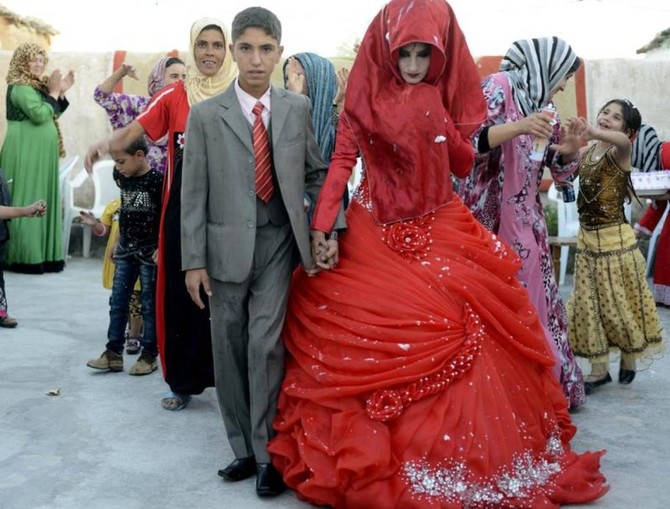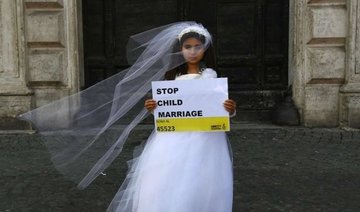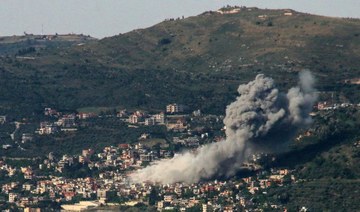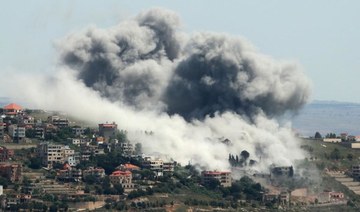BAGDHAD: A proposal in Iraq’s parliament to scrap the minimum age for Muslim girls to marry has stirred outrage among critics who view it as a license “to rape children.”
Conservative Shiite deputies on October 31 proposed an amendment to a 1959 law that set the minimum age for marriage at 18.
The initial legislation, passed shortly after the fall of the Iraqi monarchy, transferred the right to decide on family affairs from religious authorities to the state and its judiciary.
But now the new bill looks to go back on that — and would authorize the marriage of any girl if it had the consent of the religious leaders from the Shiite or Sunni Muslim community to which her parents belong.
In effect, it makes “the opinion of the Shiite and Sunni ulema (scholars) obligatory for judges,” said a liberal independent MP, Faiq Al-Sheikh, a member of Iraq’s legal commission.
Historically, he recalled, Islam has allowed the marriage of pubescent girls from the age of nine, the same as Aisha when she is believed to have been married to the Prophet Muhammad.
Social media has been flooded with criticism of the parliamentary bill, ranging from outright indignation to black humor, with anger also rife on the streets.
“It’s a law worthy of the Islamic State (jihadist group) that provides legal cover to the rape of children,” Hadi Abbas, an army retiree in the southern city of Kut, said.
Ali Lefta, a 40-year-old teacher in the port city of Basra, said it amounted to “the murder of the innocence of children” and that the bill was “the latest in a string of stupid laws based on tribal and confessional modes of thinking.”
In defense of the bill sponsored by his party, Ammar Toama, who heads the Shiite parliamentary group Fadila, said it “makes no mention of age and stipulates only that she (bride) must be pubescent, capable of deciding, and have the accord of her tutor and a judge.”
Under the Iraqi constitution, citizens have to declare their religious affiliation on certain issues. Marriage and inheritance terms for Shiites differ from those for Sunnis.
Toama said the bill’s aim was to bring the law “in line with the beliefs” of practicing Muslims.
But foreign missions in Baghdad and the United Nations have been up in arms, warning against institutionalized discrimination against women and girls.
Many Iraqis like Safia Mohssen, a mother of three girls, also remain opposed and have taken to mocking the priorities of parliamentarians.
“We have war, crises, unemployment, and yet our parliament is busy with laws that violate children’s rights!” she fumed. “The Islamists want to take us back to the Middle Ages.”
Majeda Al-Tamimi, a woman legislator, said she was confident that many of her colleagues in parliament would oppose the bill.
But whether it passes or not, women like Umm Mohammed in the conservative rural province of Zi Qar, who wed at the age of 14, said marriage was a family affair.
“Only families know when their daughter has reached puberty and at what age she can marry,” said the 65-year-old Iraqi.
‘Child marriage’ bill stirs outrage in Iraq
‘Child marriage’ bill stirs outrage in Iraq

Israeli forces repeatedly target Gaza aid workers, says Human Rights Watch

- They are among more than 250 aid workers who have been killed in Gaza since the war erupted more than seven months ago, according to UN figures
- Israel has killed more than 35,000 Palestinians in Gaza, mostly women and children, according to the health ministry in the Hamas-run territory
JERUSALEM: Human Rights Watch said on Tuesday that Israel had repeatedly targeted known aid worker locations in Gaza, even after their coordinates were provided to Israeli authorities to ensure their protection.
The rights watchdog said that it had identified eight cases where aid convoys and premises were targeted, killing at least 15 people, including two children.
They are among more than 250 aid workers who have been killed in Gaza since the war erupted more than seven months ago, according to UN figures.
In all eight cases, the organizations had provided the coordinates to Israeli authorities, HRW said.
This reveals “fundamental flaws with the so-called deconfliction system, meant to protect aid workers and allow them to safely deliver life-saving humanitarian assistance in Gaza,” it said.
“On one hand, Israel is blocking access to critical lifesaving humanitarian provisions and on the other, attacking convoys that are delivering some of the small amount that they are allowing in,” Belkis Wille, HRW’s associate crisis, conflict and arms director, said in Tuesday’s statement.
HRW highlighted the case of the World Central Kitchen, a US-based charity who saw seven of its aid workers killed by an Israeli strike on their convoy on April 1.
This was not an isolated “mistake,” HRW said, pointing to the other seven cases it had identified where GPS coordinates of aid convoys and premises had been sent to Israeli authorities, only to see them attacked by Israeli forces “without any warning.”
EU top diplomat sees US ‘fatigue’ in Mideast

- Josep Borrell strongly criticized Israel’s war campaign, saying Gazans were ‘dying and starving and suffering in unimaginable proportions’ and that it was a ‘man-made disaster’
- Josep Borrell: ‘I see a certain fatigue from the US side to continue engaging in looking for a solution’
On a visit to California, the bloc’s foreign policy chief Josep Borrell again strongly criticized Israel’s war campaign, saying Gazans were “dying and starving and suffering in unimaginable proportions” and that it was a “man-made disaster.”
“I see a certain fatigue from the US side to continue engaging in looking for a solution,” Borrell said in a speech Monday at Stanford University that was publicly released on Tuesday.
“We are trying to push with the Arab people in order to build together, the Arabs and Europeans, to make this two-state solution a reality,” he said in English.
US Secretary of State Antony Blinken has made seven trips to the Middle East since the unprecedented October 7 attack on Israel by Hamas which prompted a relentless Israeli military campaign in Hamas-ruled Gaza.
He has nudged Israel to allow in more aid, pushed against a regional escalation and pleaded for Israel to accept a two-state solution as part of a broader eventual deal that includes normalization with Saudi Arabia.
But the United States vetoed a Security Council bid to give Palestine full UN membership, arguing that statehood can only come though negotiations that address Israel’s security concerns.
The General Assembly last week passed a symbolic vote for Palestinian membership with the United States one of only nine countries to vote against.
The others opposed included two European Union members — the Czech Republic and Hungary. Among EU heavyweights, France voted in favor and Germany abstained.
Borrell acknowledged that the vote showed the European Union was “very much divided” over Gaza, unlike on the Ukraine war, and cited “historical reasons.”
“But it doesn’t mean that we don’t have to take a stronger part of responsibility because we have delegated (to) the US looking for a solution,” he said.
Borrell, a former Spanish foreign minister, in February sharply criticized the US arms flow for Israel, pointing to President Joe Biden’s own words that too many people were dying in Gaza.
Biden last week for the first time threatened to cut military aid to Israel, with one shipment of bombs already halted, if Israel defies US warnings and assaults the packed city of Rafah.
‘Nothing wrong’ with Gaza death toll figures

- Israel has killed more than 35,000 Palestinians, according to Gaza’s Health Ministry
GAZA STRIP: The World Health Organization voiced full confidence in Gaza Ministry of Health death toll figures on Tuesday, saying they were actually getting closer to confirming the scale of losses after Israel questioned a change in the numbers.
Gaza’s Health Ministry last week updated its breakdown of the total fatalities of around 35,000 since Oct. 7, saying that about 25,000 of those have so far been fully identified, of whom more than half were women and children.
This sparked allegations from Israel of inaccuracy since Palestinian authorities had previously estimated that more than 70 percent of those killed were women and children.
UN agencies have republished the Palestinian figures, which have since risen above 35,000 dead, citing the source.
“Nothing wrong with the data, the overall data (more than 35,000) are still the same,” said WHO spokesperson Christian Lindmeier at a Geneva press briefing. “The fact we now have 25,000 identified people is a step forward,” he added.
Based on his own extrapolation of the latest Palestinian data, he said that around 60 percent of victims were women and children, but many bodies buried beneath rubble were likely to fall into these categories when they were eventually identified.
He added that it was “normal” for death tolls to shift in conflicts.
“We’re basically talking about 35,000 people who are dead, and really every life matters, doesn’t it?” Liz Throssel, spokesperson for the UN human rights office, said at the same briefing. “And we know that many and many of those are women and children and there are thousands missing under the rubble.”
Lebanon state media says Israel strike kills two

- The enemy drone strike that targeted a car on the Tyre-Al-Hush main road martyred two people
BEIRUT: Lebanon’s state-run news agency said an Israeli drone strike on a car in the country’s south killed two people on Tuesday evening.
Israel and Hamas ally Hezbollah have exchanged near-daily fire following the Palestinian group’s October 7 attack on southern Israel that sparked war in Gaza.
“The enemy drone strike that targeted a car on the Tyre-Al-Hush main road martyred two people,” the National News Agency said, also reporting that ambulances had headed toward the site of the strike.
At least 413 people have been killed in Lebanon in seven months of cross-border violence, mostly militants but also including 79 civilians, according to an AFP tally.
Israel says 14 soldiers and 10 civilians have been killed on its side of the border.
Tens of thousands of people have been displaced on both sides.
Hostages’ plight casts pall over Israel’s Independence Day

- The more than seven-month war in Gaza and the absence of the remaining hostages have cast a long shadow over the normally joyous day
- “Like in Pesach (Jewish Passover), I didn’t feel it’s really a holiday of liberation,” Lavi Miran added
TEL AVIV: On Israel’s 76th Independence Day, victory feels far away for many agonizing over the fate of dozens of hostages still held in the war-ravaged Gaza Strip.
“On one side we’re still here, my daughters are still here, my family’s still here, and Israel is still here,” said Lishay Lavi Miran, from the Nir Oz kibbutz community, less than a kilometer (0.62 miles) from the Gaza border.
“But it’s not really independence because... Omri is over there,” added the 39-year-old, referring to her husband who was kidnapped and taken to the Palestinian territory on October 7 alongside about 250 other hostages.
He is among 128 captives who remain in Gaza, 36 of whom the army says are dead.
On May 14 every year, Israelis celebrate the anniversary of their state’s creation.
But the more than seven-month war in Gaza and the absence of the remaining hostages have cast a long shadow over the normally joyous day.
“Like in Pesach (Jewish Passover), I didn’t feel it’s really a holiday of liberation. I don’t feel now that there is really something to be happy about,” Lavi Miran added.
Batia Holin, from the neighboring kibbutz community of Kfar Aza, expressed similar feelings, saying “there is no independence here.”
Several Kfar Aza residents are still captive in Gaza.
Holin and other residents of the southern Israeli communities surrounding the border with Gaza have been evacuated since the October 7 Hamas attack.
“Even though I am in my country, I cannot be in my home and I will not be able to return for at least three years,” Holin, 71, said. “What kind of independence is this?“
And in northern Israel, where there have been a regular exchange of fire between Israeli forces and Lebanon’s Hezbollah, tens of thousands have been displaced.
“They can’t go home and have become refugees,” lamented Holin.
The unprecedented October attack saw militants surge through Gaza’s militarised border and resulted in the deaths of more than 1,170 people, mostly civilians, according to an AFP tally of official Israeli figures.
Israel responded with a relentless military campaign in the Hamas-run territory that has so far killed more than 35,100 people, according to the Gaza health ministry.
Israel is “a sovereign country where its citizens are refugees... It’s terrible,” Holin continued, recalling a brief return home to the community where more than 60 people were killed. She shut the door and left.
“That’s it. I don’t have a home anymore.”
Israel was founded in 1948 on the vow of a “Jewish national home” with the promise of safety to Jews, six million of whom were murdered during the Holocaust.
Based on this promise, many migrated to the newly formed state, including Lavi Miran’s grandparents who arrived from Libya and Azerbaijan.
For Palestinians, that period is known as the “Nakba,” or catastrophe, marked on May 15 every year to commemorate the mass displacement of around 760,000 Palestinians during the war that accompanied Israel’s creation.
During the Hamas attack, fighters ransacked Lavi Miran’s home “and took a lot of things. Even after seven months, I can’t touch stuff over there,” she said.
“They trashed all the house. They threw all of our clothes.”
But to her, the priority remains the return of the hostages. She has joined the regular protests by thousands calling on the Israeli government to reach a deal that would bring them back.
On Sunday, during a ceremony marking Memorial Day to commemorate fallen soldiers and civilian victims of attacks on Israel, army chief Herzi Halevi acknowledged he was “fully responsible” for the events of October 7.
“Hamas won the war, because they’re not here,” said Lavi Miran, referring to the hostages.
“Home, it’s just when he comes back,” she continued, referring to her husband Omri, a 47-year-old massage therapist.
“It’s like a nightmare. They’re in hell.”




















